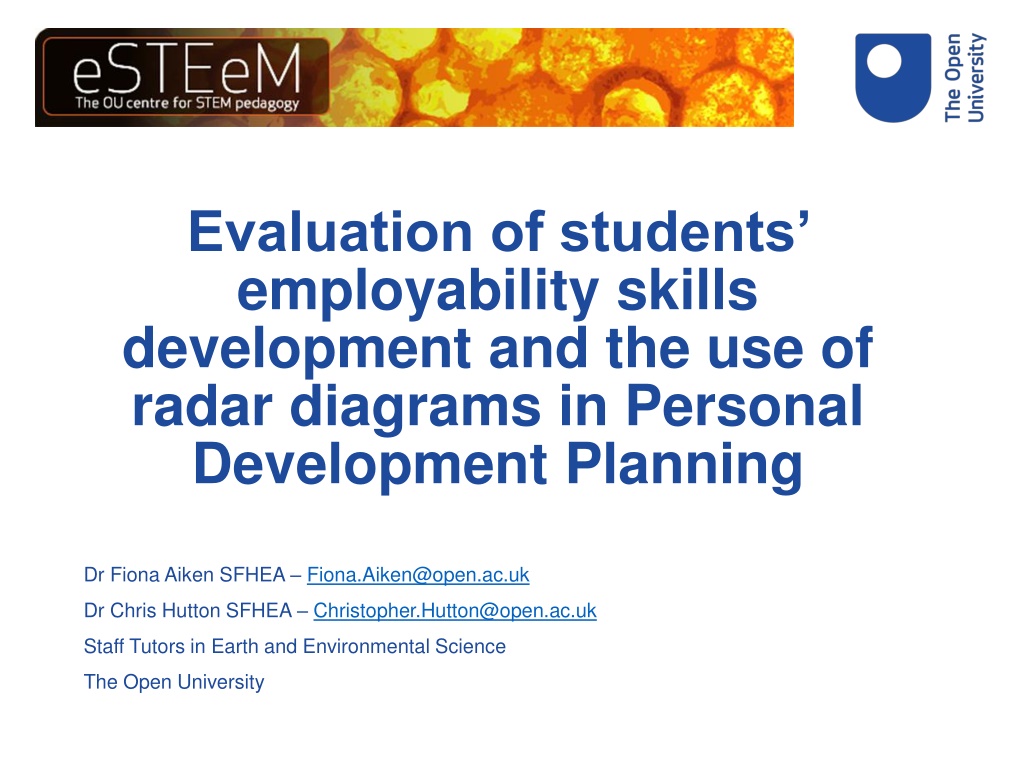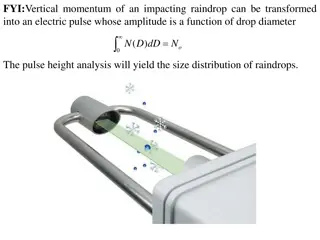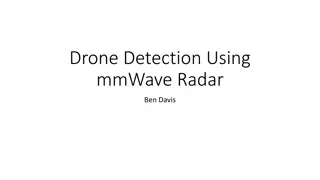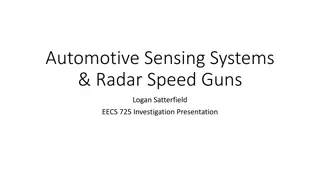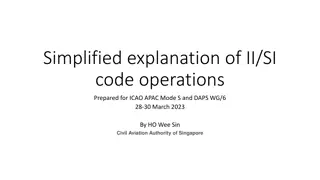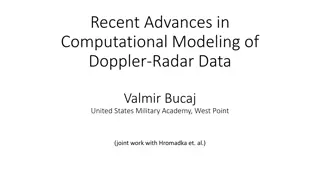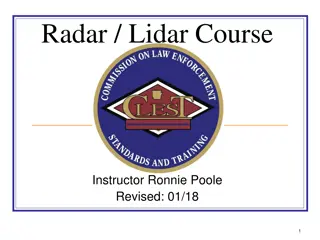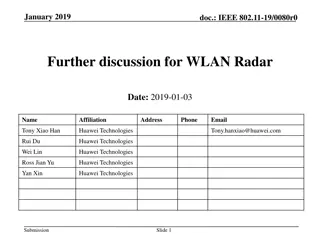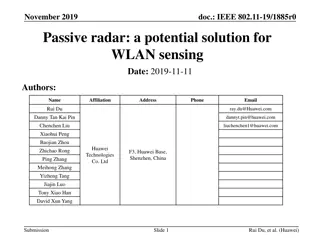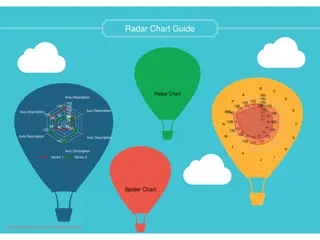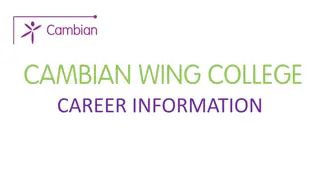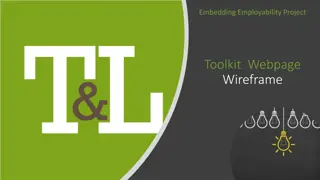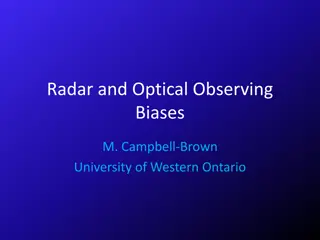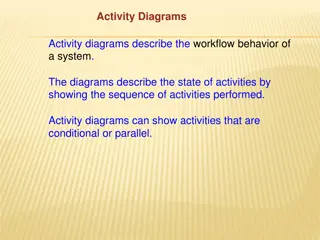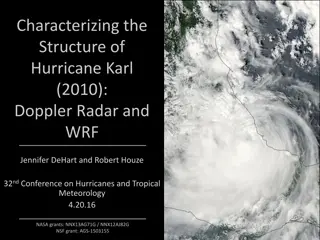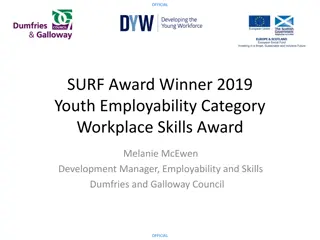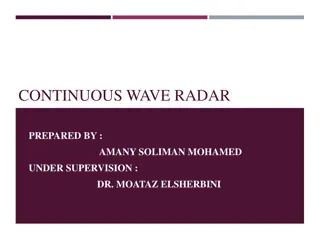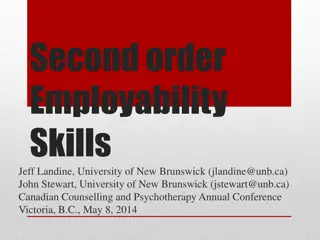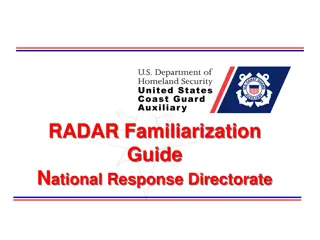Evaluation of Students' Employability Skills Development Using Radar Diagrams in Personal Development Planning
This study focuses on assessing students' employability skills development through the use of radar diagrams in Personal Development Planning (PDP). The research evaluated students' self-assessment and reflection on skills improvement with a specific focus on collaborating with others and self-reflection. Results and discussions from student assignments provide insights into changes in skills scores across various competencies. The study aims to understand the extent to which students demonstrate employability skills development and their perceptions of growth in these skills through the module.
- Employability Skills
- Radar Diagrams
- Personal Development Planning
- Higher Education
- Skills Assessment
Download Presentation

Please find below an Image/Link to download the presentation.
The content on the website is provided AS IS for your information and personal use only. It may not be sold, licensed, or shared on other websites without obtaining consent from the author. Download presentation by click this link. If you encounter any issues during the download, it is possible that the publisher has removed the file from their server.
E N D
Presentation Transcript
Evaluation of students employability skills development and the use of radar diagrams in Personal Development Planning Dr Fiona Aiken SFHEA Fiona.Aiken@open.ac.uk Dr Chris Hutton SFHEA Christopher.Hutton@open.ac.uk Staff Tutors in Earth and Environmental Science The Open University
Outline 1.Background 2.Context 3.Research questions and approach 4.Results and Discussion 5.Conclusions 24/09/2024
Background The national picture Employability skills have to be embedded in all HE courses Key review Wakeham, 2016 Skills development is strongly liked to Personal Development Planning (PDP) Students are encouraged to self-assess skills, and then reflect to plan improvements. E.g. Kolb s Learning Cycle Image credit: https://www2.le.ac.uk/departments/doctoralcollege/training/eresources/teaching/theories/kolb 24/09/2024
Context Skills development on S112 Students regularly self-assess skills using a radar diagram Required in each of 6 assignments, with reflection Science: concepts and practice New, multidisciplinary module from Oct 2017 60 credits FHEQ Level 4 Focussed on skills 24/09/2024
Context We looked at two groups of Learning Outcomes 1. Collaborating with others 24/09/2024
Context 2. Self reflection and planning 24/09/2024
Research Question 1 and Approach Tutor Focus Group Assignment submissions Student Questionnaire To what extent do students demonstrate development of employability skills through S112? 24/09/2024
Research Question 2 and Approach Tutor Focus Group Student Questionnaire What are students perceptions of their employability skills development through S112? 24/09/2024
Results and Discussion Student assignments (n = 19) : Collaborating with others Percentage frequencies of change in score 50 45 40 35 30 25 20 15 10 5 0 -2 -1 0 1 2 3 4 5 6 7 8 B/C Aware Digi cont Teams Comment Contribute 24/09/2024
Results and Discussion Student assignments (n = 18): Self-reflection and planning Percentage frequencies of change in score 70 60 50 40 30 20 10 0 -3 -2 -1 0 1 2 3 4 5 6 Ref Prac Ref F/back PDP Time man 24/09/2024
Results and Discussion Student questionnaire (n=115, 18%): Collaborating with others 100 90 80 70 60 % agreement 50 40 30 20 10 0 Contributing to discussions Commenting on the work of Working in a team Sharing digital content Business and Customer Awareness others Important to students Important to employers Well developed by module 24/09/2024
Results and Discussion Student questionnaire (n=115, 18%): Self-reflection and planning 100 95 90 % agreement 85 80 75 Time management Personal Development Planning Reflecting on feedback Reflecting on your practice Important to students Important to employers Well developed by module 24/09/2024
Results and Discussion Student Questionnaire (n=115, 18%): 93% used radar diagrams Percentage agreement on radar diagram questions 100 90 80 70 60 50 40 30 20 10 0 Easy to understand Easy to use Easy to see progress Focus on improvement Assess skills Develop skills Used to get marks Agree Neither Disagree 24/09/2024
Results and Discussion Student questionnaire: main emerging themes Theme Sub-themes (number comments) Time management Negative (6) Positive (10) Negative (3) Positive (4) Negative (11) Positive (10) Negative (0) Positive (7) Negative (53) Positive (17) Just for marks (20) Problems self-assessing (40) Technical problems (18) Bad idea for progression (40) Good idea for progression (8) Communication Group work Reflecting on feedback Radar diagrams as a tool 24/09/2024
Results and Discussion Associate Lecturer Focus Groups Compared 3 ALs who participated in project with 3 ALs who weren t involved Both groups of ALs agreed on: The importance of their advice to students That the module developed skills well The ALs involved in the project provided richer information There was a difference when comparing the number of positive and negative comments on radar diagrams: Involved 8 2 Not involved 4 6 Positive Negative could this be evidence of unconscious bias in the ALs involved? May affect the presentation of radar diagrams and skills development to students. 24/09/2024
Conclusions Students showed improvement in self-assessment scores, except Business and Customer Awareness Questionnaire supports this - least valued skill Embed at qualification level, not module Most engaged with radar diagrams to gain marks Majority found radar diagrams usable and understandable < 50 % students found value in radar diagrams for PDP Students struggle to self-assess at module start The role of AL advice is key can also affect student perceptions 24/09/2024
References Archer, W. and Davison, J. (2008) Graduate Employability: What do employers think and want? [Online], The council for Industry and Higher Education https://aces.shu.ac.uk/employability/resources/0802Grademployability.pdf (Accessed 26Jan 2018) Higher Education Policy Unit (2015) Employability; Degrees of Value, [online] https://www.hepi.ac.uk/2015/12/10/2928/ (accessed 18th Apr 2019) Lowden, K., Hall, S., Elliot, D. and Lewin, J. (2011) Employers perceptions of the employability skills of new graduates [Online], Edge Foundation. Available at https://aces.shu.ac.uk/support/staff/employability/resources/Edge_employability_skills.pdf (Accessed 26th Jan 2018) Wakeham, W. (2016) Wakeham review of STEM degree provision and graduate employability [Online], HM UK Government. Available at: https://www.gov.uk/government/uploads/system/uploads/attachment_data/file/518582/ind-16-6-wakeham- review-stem-graduate-employability.pdf (Accessed 22 Feb 2017). Wakeham, W. (2017) Keynote presented at HEA STEM Conference 2017: Achieving Excellence in Teaching and Learning. Manchester, UK, 1-2 Feb [Online]. Available at https://www.heacademy.ac.uk/system/files/downloads/prof_sir_william_wakeham_hea_stem_conference_pre sentation.pdf (Accessed 26 Jan 2018).
Any questions?... Thank-you for attending Dr Fiona Aiken SFHEA Fiona.Aiken@open.ac.uk Dr Chris Hutton SFHEA Christopher.Hutton@open.ac.uk Staff Tutors in Earth and Environmental Science The Open University Acknowledgements: Isabella Henman, Jane Kendall-Nicholas and Niusa Marigheto 24/09/2024
